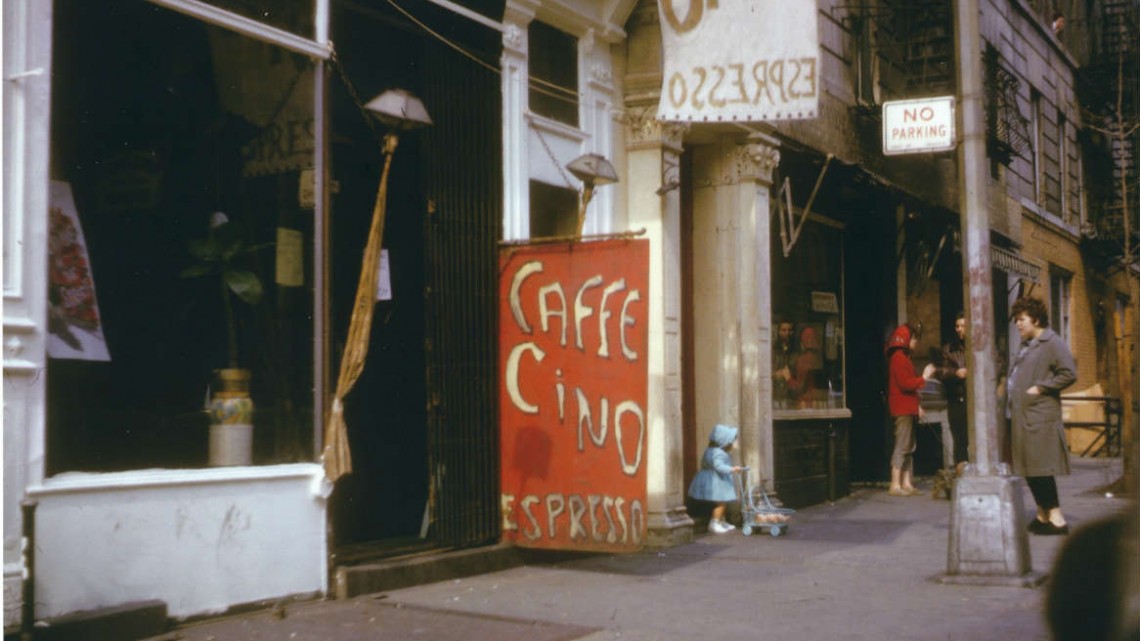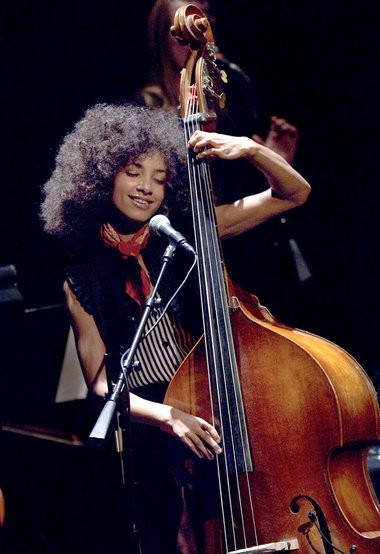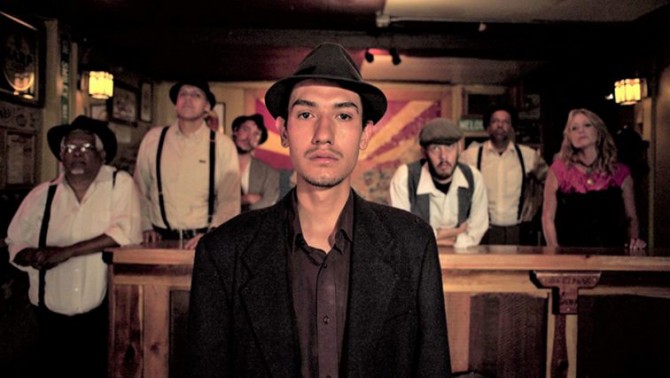
Caffe Cino, in New York’s Greenwich Village, in 1962.
Things to Do, April 12-19, 2019
Resurrected bass unites past, present
The Cornell Concert Series is presenting “The Spring Quartet” – a jazz supergroup made up of living legends Jack DeJohnette, Joe Lovano, Esperanza Spalding and Leo Genovese – on April 15 at 8 p.m. in Bailey Hall.
In addition to showcasing a once-in-a-lifetime lineup of jazz greats, this concert will be special because of the double bass Spalding will play. A bittersweet local tie-in connects it to the history of jazz.
In the 1960s, Scott LaFaro was the hottest bass player around. His family moved to Geneva, New York, when he was 5 and he groomed his chops in the Finger Lakes. He had just graduated from Ithaca College, but he was so good that he played with the best jazz musicians, including the Bill Stewart Trio and Stan Getz.
LaFaro was in high demand – and the consequences proved tragic. On the evening of July 6, 1961, driving between gigs in Geneva and Canandaigua, New York, he fell asleep at the wheel and was killed in an accident. The crash almost destroyed his bass – almost.
In the aftermath of the tragedy, someone took the damaged antique – built by Abraham Prescott of Concord, New Hampshire, in 1825 – and locked it away. More than 20 years later, the bass was taken out of storage and beautifully reconditioned. The instrument is now housed with the International Society of Bassists, whose president is Ithaca College professor Nicholas Walker.
When Cornell Concert Series manager Deborah Justice saw that Esperanza Spalding would need to borrow a bass for the show, the LaFaro bass was an obvious choice. “It’s not so often that a concert can bring layers of local history to light in this way,” Justice said. “This will be a very special night that no true jazz fan should miss.”
Tickets are $19 for students, and $29 to $39 general admission. Attendees who require special accommodations can call Concert Series public relations at (607) 255-5144.
Student film festival
Films by selected Cornell students and other student filmmakers in the region will screen at the sixth annual Centrally Isolated Film Festival, April 12-13 at the Schwartz Center for the Performing Arts’ Film Forum.
The festival aims to bring together student filmmakers from central and upstate New York. Prizes of $200 will be awarded in the categories of best narrative, documentary, experimental and audience choice.
The showings begin April 12 at 4:30 p.m. and continue April 13 at 2 p.m., and are free and open to the public. A reception in the lobby will follow screenings on both days.
Off-Off-Broadway at Black Box
The Caffe Cino in New York’s Greenwich Village is considered the birthplace of Off-Off-Broadway, theater that is more experimental and less commercial than mainstream productions. It was a haven for budding playwrights and performers, as well as for the queer community, from 1958-68.
A show titled “An Evening at the Caffe Cino” pays homage to the historic venue, from April 18–20 in the Schwartz Center for the Performing Arts’ Black Box Theatre.
Evolving from its start as an intimate coffeehouse and art gallery, the Caffe Cino became a launchpad for the early careers of playwrights such as Sam Shepard, John Guare, Doric Wilson, Lanford Wilson, Irene Fornes, Robert Patrick, Robert Heide and William M. Hoffman.
The show – conceived, curated and directed by Samuel Blake, a doctoral student in performing and media arts – will feature four short plays that debuted at the Caffe Cino, including Patrick’s “Indecent Exposure” and Heide’s “Moon,” as well as snippets of archival material.
“The goal of this project,” Blake said, “is both to explore how an archive can be animated through performance and, perhaps more importantly, share the legacy of the Caffe Cino as a nascent queer theatre space.”
Performances are April 18, 7:30 p.m.; April 19, 5 p.m.; and April 20 at 2 p.m. and 7:30 p.m. Tickets are $5 at schwartztickets.com or the Schwartz Center box office, open 1-8 p.m. Monday through Saturday.
Deportation documented
Cornell Cinema is premiering three films this week: “Rafiki” (2018) on April 12, “Bisbee ’17” (2018) on April 15 (free admission) and “Territorio” (2016) on April 17.
All showings will start at 7 p.m. in the Willard Straight Theatre. Tickets are $9 general, $6.50 for students, $5.50 for grads and children 12 and younger, and $7 for seniors. More ticket information can be found on the Cornell Cinema website.
“Rafiki,” showing as part of the World Cinema series, is a story of love between two young women in Kenya, a country that still criminalizes homosexuality. Initially banned in Kenya for its positive portrayal of queer romance, “Rafiki” won a landmark court case that chipped away at Kenyan anti-LGBT legislation.
“Bisbee ’17” is the true story of an old mining town on the Arizona-Mexico border finally reckoning with its darkest day: the deportation of nearly 2,000 immigrants, primarily Mexican and Eastern European miners, in 1917. The film follows several members of the close-knit community as they attempt to process this long-buried and largely forgotten event that came to be known as the Bisbee Deportation. Wrote the Los Angeles Times: “One of the pleasurable discoveries of this surprising movie is that artifice can be the most direct route to the truth.”
“Territorio,” part of the Experimental Lens series, is a poetic portrait of Ecuadorians. Deriving its structure from the travel journals of avant-garde poet Henri Michaux, the film follows Michaux’s journey across Ecuador, observing its citizens in independent, subtly composed static shots. The film will be presented by its director, filmmaker Alexandra Cuesta.
Award-winning poet at Statler
Award-winning poet and writer Claudia Rankine will read from her work for the Robert Chasen Memorial Poetry Reading on April 18 at 5 p.m. in the Alice Statler Auditorium, Statler Hall. Admission is free and open to the public, but tickets are required. Tickets, while they last, are available at the Willard Straight Hall Resource Center.
Doors will open at 4:30 p.m.; books by the author will be available for purchase, courtesy of Buffalo Street Books.
A New York Times review of Rankine’s bestselling book “Citizen” lauds her ability to make “racism relevant, or even evident, to those who do not bear the brunt of its ill effects.”
Rankine has written five collections of poetry, including “Citizen” (winner of the 2015 Forward Prize for Best Collection and a finalist for the National Book Award) and “Don’t Let Me Be Lonely,” plus two plays. She’s been part of numerous video collaborations and is the editor of several anthologies.
This reading, which will conclude the Spring 2019 Barbara & David Zalaznick Reading Series, is sponsored by the Creative Writing Program of Cornell’s English Department.
Media Contact
Get Cornell news delivered right to your inbox.
Subscribe


